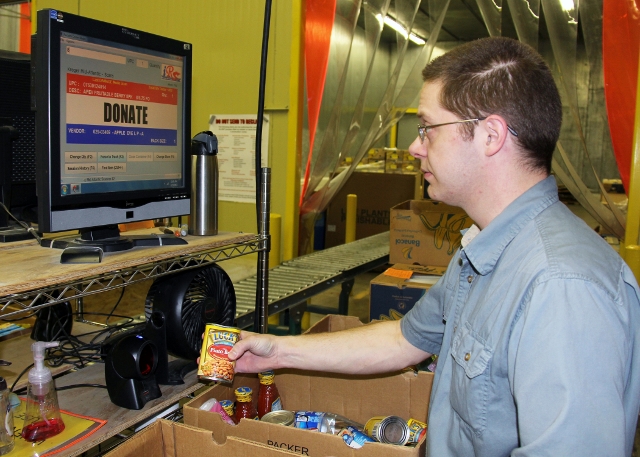
What began with a test in the Roanoke Valley is resulting in a program Kroger has been quietly implementing across the country to help feed more hungry Americans.
Last year Kroger launched a pilot program with Feeding America Southwest Virginia, based in Salem, and the Freestore Food Bank in Cincinnati to distribute non-perishable goods not purchased in its stores to the food banks.
Kroger equipped the food banks with the software and hardware to process and track goods. In addition, Kroger pays for a supervisor to oversee the process at Feeding America Southwest Virginia’s distribution center in Salem.

Kroger is donating the non-perishable goods and using the same level of sophisticated supply chain management that the company is using across its 2,400 stores and with its existing perishable donation program, says Oscar Fussenegger, corporate reclamation manager for Kroger.
With the success of the pilot programs in the Roanoke Valley and Cincinnati, Kroger has now expanded the program to 12 food banks across the country. More than 8 million items worth more than $14.3 million have been sent directly to the food banks.
“The model that Kroger has put together is different from anything we’ve had,” said Eric Davis, director of retail product sourcing at Feeding America, the national hunger relief organization. “Kroger has made this so simple.”
Initially, Kroger considered setting up its own reclamation center, but instead decided to cut out the middle man and partner with food banks to make them reclamation centers.
“Using software and training provided by Kroger, Feeding America Southwest Virginia discards the trash, obtains the data needed to process vendor payments or credits due to Kroger, and then distributes the edible and safe food to hungry people,” said Fussenegger, a 35-year year veteran with Kroger.
The donations make up approximately six percent of Feeding America Southwest Virginia’s monthly product base. Kroger’s program has sent more than $1,245,000 worth of goods to Southwest Virginia since April, 2012.
“This is an innovative private-public partnership at its best,” said Pamela Irvine, president and CEO of Feeding America Southwest Virginia. “We are fortunate that Kroger and its Mid-Atlantic region chose us to participate in the program. In additional, more than 3,000 volunteers, including Kroger employees, have helped process these donations, enabling us to reach more than 122,000 people every month through our charitable food distribution system.”
For years, Kroger sent its unsold non-perishable products to third-party companies that would discard damaged foods and send the rest back to the manufacturer, sell the goods to discount operations, or route the goods to food banks. “The process was costly and inefficient,” said Fussenegger.
“The Southwest Virginia food bank is special in many ways,” said Fussennegger. “The team embraced our pilot, worked hard to make a home for the project and helped Kroger grow the concept.”
Kroger first developed the technological infrastructure so that food banks could efficiently receive, sort and track non-perishable items. If a product is recalled, the food bank must be able to find and destroy affected items and confirm that action with Kroger and the supplier.
Then, Kroger has to establish support from its suppliers, who usually sell non-perishable items in the reclamation market or donate them. “Kroger convinced the suppliers it would be more efficient if the goods went directly to food banks,” said Fussenegger. “We are pushing all our suppliers to let unsold goods go directly into the food banks’ networks.”
It’s a win-win situation, said Carl York, spokesperson for the Mid-Atlantic region, which is based in Roanoke. “Food banks are getting more food donations and less waste because they are involved earlier in the process. Kroger is saving money and has better control of its inventory.”
Kroger currently sends about five truckloads of non-perishable goods to Feeding America Southwest Virginia every month. The donations have become an important part of the inventory, says Irvine. The food bank expects the reclamation program to contribute 750,000 pounds of food in 2013.
Kroger’s Mid-Atlantic region operates 120 stores in Virginia, West Virginia, North Carolina and the eastern portions of Tennessee, Kentucky and Ohio from its headquarters in Roanoke.


